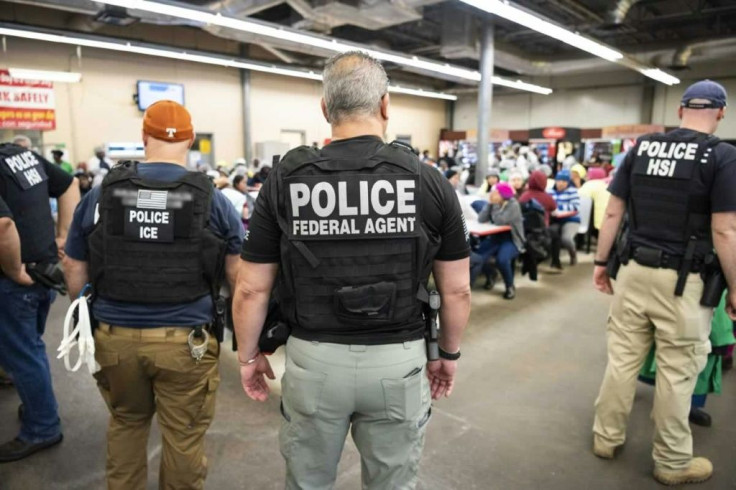'Don't Open The Door': US Activists Organize To Thwart ICE

Though she speaks little English, Yoana was calm when two officers from the US federal agency tasked with deporting undocumented people such as herself appeared outside her apartment.
Reading from a card that said, "This is to advise any law enforcement officer that I cannot answer any questions," she parried their demands until the agents from Immigration and Customs Enforcement (ICE) left.
"I didn't have fear. I knew what my rights were," said Yoana, 36, a native of Mexico who works on the apple farms of Harrisburg, Pennsylvania and spoke to AFP on condition that her full name not be published.
That she knew what to do when approached by ICE was due to the efforts of activists across the United States, who are finding novel ways to thwart President Donald Trump's crackdown on migrants -- ranging from educating undocumented people like Yoana about their rights under US law to filming immigration agents in public.
Trump has pushed wide-ranging immigration law reforms, while tasking ICE with carrying out mass deportations of people in the US illegally.
Rights groups, in turn, have criticized the agency for making indiscriminate arrests and terrorizing immigrants.
"The immediate and extreme impact an immigration enforcement action has on an individual and their family is not lost on our officers," ICE wrote in an open letter released in September.
"Our officers do their jobs professionally, humanely, and treat those they encounter with dignity and respect."
'Know Your Rights'
Amid the crackdown, immigrant rights groups have set up hotlines for people to call if they think ICE may be in their neighborhoods, while dispatching lawyers and camera-wielding activists to record the activities of agents in public.
After Trump threatened in June to deport "millions" of illegal immigrants, the Georgia Latino Alliance for Human Rights formed "ICE Chasers," a group that looks for ICE in immigrant neighborhoods early in the morning -- when agents often target people as they head to work.
"In case we encounter any ICE official doing an arrest, we want to document and observe the proper usage of the civil rights," the group's executive director Adelina Nicholls said in an interview.
Rights groups across the country are also encouraging immigrants like Yoana to attend training on law dubbed "Know Your Rights."
At a recent session held by Washington-area group CASA in Langley Park, Maryland, an instructor told a dozen immigrants what they could and couldn't do when encountering law enforcement.
Chief among them: "Don't open the door," in case it's ICE agents who are outside.
In the neighborhood where she lives with her two undocumented siblings, Lidamar Escorcia described an atmosphere of dread.
"There's just constant fear and anxiety when there's knocks on the door," said the 32-year-old Nicaraguan, who is in the US legally.
Armed with cameras
Elsewhere, advocacy groups have disseminated on social media photos of suspected ICE agents staking out neighborhoods or courthouses, while setting up hotlines for people to call for help if federal agents come to their door.
"Law enforcement acts differently when it knows it's being witnessed and watched," said Laura Williamson, an organizer with Washington-area group Sanctuary DMV, whose volunteers go out and film arrests.
ICE's acting press secretary Bryan Cox told AFP that people film officers "routinely" and said the agency "fully respects the rights of all people to peacefully voice their opinion without interference."
Immigrant advocates say they don't encourage people to obstruct officers or resist violently.
"If ICE really wants to go after someone, the chances are, they'll get them," said Nick Katz, senior manager of legal services for CASA.
Standoff
When agents tried to arrest a father and son in their car in a suburb of Nashville, Tennessee in July, a crowd of neighbors gathered, giving the pair food and putting gas in their idling car so they could run the air conditioning in the summer heat.
After several hours, ICE, lacking a warrant to force them out of the car, withdrew, and the family fled to safety.
"They made an environment where the family was able to outlast the ICE agents," said Lisa Sherman-Nikolaus, policy director for the Tennessee Immigrant & Refugee Rights Coalition.
That episode took place days after the Trump administration announced it would launch large-scale immigration raids aimed at 2,000 undocumented migrants in 10 cities.
There was little evidence of those roundups happening, but weeks later, 680 undocumented migrants were arrested in mass raids in the southeastern US.
"The administration is trying to scare the community in whichever way they can," Katz said. "Our Know Your Rights training is how you fight."
© Copyright AFP 2024. All rights reserved.





















